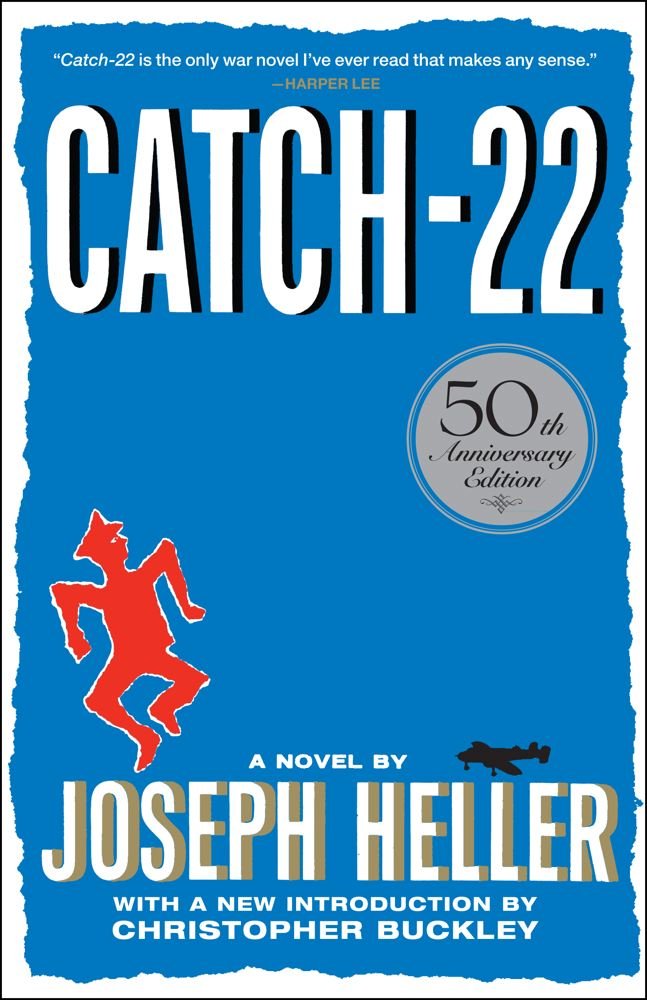A few weeks ago I wrote a post on all those novels–including three of my own–that started off with a title other than the one that ended up on the dust jacket in the bookstore. You can read that post–“What’s in a Name? More than you imagine!”–here.
But it was only later that I realized I’d left out my favorite title evolution story, namely, the tortured tale of the various rejected titles of the Joseph Heller novel that was eventually published as Catch-22. It’s a wonderful story.
For those who haven’t read this satirical World War II novel, the title is a fictional military rule that captures the illogical and immoral reasoning of the military bureaucracy. The rule states (a) that if the soldier is crazy, the soldier does not have to fly military missions; and (b) a soldier has to be crazy to fly one of those missions. But Catch-22 of the rule states that the soldier must apply to be excused, and by applying the soldier demonstrates that he is not crazy. As a result, one must continue flying, either by not applying to be excused, or by applying and being refused. As the narrator explains:
There was only one catch and that was Catch-22, which specified that a concern for one’s safety in the face of dangers that were real and immediate was the process of a rational mind. Orr was crazy and could be grounded. All he had to do was ask; and as soon as he did, he would no longer be crazy and would have to fly more missions. Orr would be crazy to fly more missions and sane if he didn’t, but if he were sane he had to fly them. If he flew them he was crazy and didn’t have to, but if he didn’t want to he was sane and had to. Yossarian was moved very deeply by the absolute simplicity of this clause of Catch-22 and let out a respectful whistle.
The term Catch-22 quickly entered the American language, where the dictionary defines the word as “a frustrating situation in which one is trapped by contradictory regulations or conditions.”
 The opening chapter of the novel was originally published in a small literary magazine in 1955 as Catch-18. But Heller’s agent apparently asked him to change the title of the novel so it would not be confused with another recently published World War II novel, Mila 18 by Leon Uris. (Apparently, the number 18 had special significance to Heller in Judaism, where it means “alive.”) Reluctantly, Heller tried to change the name to Catch-11, but the publisher nixed that because of the recent release of the movie Ocean’s Eleven. So next came Catch-17, but the publisher again said no, concerned that it might be confused with the World War II film Stalag 17. Heller then proposed Catch-14, but that, too, was rejected, apparently because the publisher didn’t feel that 14 was a funny number. You can find the full story here.
The opening chapter of the novel was originally published in a small literary magazine in 1955 as Catch-18. But Heller’s agent apparently asked him to change the title of the novel so it would not be confused with another recently published World War II novel, Mila 18 by Leon Uris. (Apparently, the number 18 had special significance to Heller in Judaism, where it means “alive.”) Reluctantly, Heller tried to change the name to Catch-11, but the publisher nixed that because of the recent release of the movie Ocean’s Eleven. So next came Catch-17, but the publisher again said no, concerned that it might be confused with the World War II film Stalag 17. Heller then proposed Catch-14, but that, too, was rejected, apparently because the publisher didn’t feel that 14 was a funny number. You can find the full story here.
And thus we ended up with Catch-22–the sixth choice back then. More than a half century later, it’s hard to imagine that novel with any other name.
